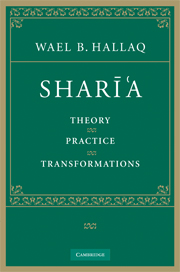Book contents
- Frontmatter
- Contents
- Preface and acknowledgments
- Introduction
- Part I The pre-modern tradition
- 1 The formative period
- 2 Legal theory: epistemology, language and legal reasoning
- 3 Legal education and the politics of law
- 4 Law and society
- 5 The Circle of Justice and later dynasties
- Part II The law: an outline
- Part III The sweep of modernity
- Appendix A Contents of substantive legal works
- Appendix B Chronology
- Bibliography
- Index
3 - Legal education and the politics of law
epistemology, language and legal reasoning
Published online by Cambridge University Press: 05 June 2012
- Frontmatter
- Contents
- Preface and acknowledgments
- Introduction
- Part I The pre-modern tradition
- 1 The formative period
- 2 Legal theory: epistemology, language and legal reasoning
- 3 Legal education and the politics of law
- 4 Law and society
- 5 The Circle of Justice and later dynasties
- Part II The law: an outline
- Part III The sweep of modernity
- Appendix A Contents of substantive legal works
- Appendix B Chronology
- Bibliography
- Index
Summary
Introduction
It is impossible to speak of legal education over the course of Islamic history without having to deal with issues of politics and political legitimacy; hence the conjunction of both realms within the confines of this chapter. Yet, during the first two or three centuries, education was largely and deliberately disconnected from politics, being limited to private scholarship which the rulers sought to influence without much success. The story of this chapter is that of the transformation of legal scholarship from a highly independent enterprise to a markedly subordinate system that came to serve the ruler and his administration. However, a significant aspect of this story must not escape emphasis, namely, that despite this eventual subordination the content of the law and its application remained uncompromised by any political accommodation. In fact, it was the ruler who – from the beginning of Islam until the middle of the nineteenth century – consistently had to bow to the jural wishes of the Sharīʿa and its representatives in governing the populace. As a moral force, and without the coercive tools of a state, the law stood supreme for over a millennium.
In mapping out the history of legal education in Islam, one must begin with the study circle (ḥalaqa; variant: ḥalqa), the essential unit of legal scholarship until the early nineteenth century. But the ḥalaqa, as an eminently educational institution, did not remain intact for long.
- Type
- Chapter
- Information
- Sharī'aTheory, Practice, Transformations, pp. 125 - 158Publisher: Cambridge University PressPrint publication year: 2009



